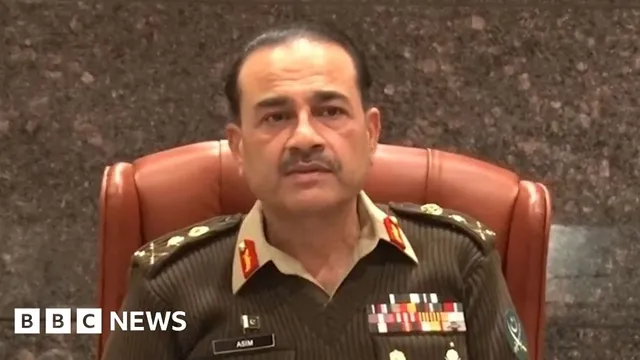
Asim Munir's Kashmir remarks spark outrage in India
2025-04-30 21:44- General Asim Munir made controversial remarks about Kashmir amidst rising tensions.
- His comments came just days after a deadly militant attack in Indian-administered Kashmir.
- The speech has heightened suspicions and could affect Pakistan's diplomatic stance in the region.
Express your sentiment!
Insights
In recent days, Pakistan’s army chief, General Asim Munir, has faced criticism for his remarks regarding Kashmir, which many believe exacerbated tensions with India. His comments come just days prior to a deadly militant attack in Indian-administered Kashmir that killed 26 people, leading to India accusing Pakistan of supporting the attackers, a claim that Islamabad strongly denies. Gen Munir's speech stands out at a time when he is solidifying his authority within a military institution known for its significant influence in the country's affairs. Having taken over as army chief in November 2022, Gen Munir has not shied away from addressing politically charged issues like Kashmir, seen as a core national security interest in Pakistan. General Munir's approach reportedly contrasts with that of his predecessor, Qamar Javed Bajwa, who was known for more careful diplomacy with India. This change in strategy has raised concerns among observers, particularly given the historical disputes surrounding Kashmir that have long strained relations between the two nuclear-armed neighbors. Analysts are interpreting Munir’s remarks, particularly in the wake of the recent attack, as indicative of a firmer stance that may signal a pivot back to overt military authority in foreign policy matters. The recent attack, described as the deadliest violence against civilians in Indian-administered Kashmir in two decades, underscores the ongoing volatility in the region. Such incidents typically invoke strong reactions from both the Indian government and its military, elevating the stakes for regional security. Critics of General Munir's comments warn that they could deepen misgivings on both sides and complicate any diplomatic engagements moving forward. While some see his statements as asserting military power, others caution that they may exacerbate an already tense climate both domestically and internationally. As the situation continues to evolve, many are closely monitoring Munir's next steps. His ability to navigate the crisis triggered by his remarks could serve as a defining moment not only for his military leadership but also for Pakistan’s role on the global stage. If his comments lead to further escalations, this could have serious implications for regional stability, as the history of conflict in Kashmir remains a potent source of discord between Pakistan and India. The growing concerns over national security and rising tensions emphasize the intricate and fragile balance in South Asian geopolitics, demanding careful responses from both countries.
Contexts
The Kashmir conflict, a territorial dispute primarily between India and Pakistan, has its roots in the partition of British India in 1947. As the British withdrew, two independent nations were created: India and Pakistan. The princely states were given the option to join either nation. The Maharaja of Jammu and Kashmir, Hari Singh, initially opted to remain independent, leading to tensions as both nations claimed the region. When armed tribal invasions from Pakistan occurred in October 1947, the Maharaja sought military assistance from India, which led to his decision to accede to India in exchange for military aid. This decision sparked the first Indo-Pakistani war, resulting in a ceasefire brokered by the United Nations and the establishment of the Line of Control (LoC), which still divides the region today. Over the decades, the Kashmir conflict has escalated, influenced by national identity, religion, and political ideology. The northern region holds significant strategic value, rich in resources and geography that are crucial to both nations' security policies. India views Kashmir as an integral part of its territory, embodying its secular and multi-ethnic character, while Pakistan regards Kashmir as a disputed territory that denotes the historical injustices faced by Muslims in the region. The political rhetoric from both sides has often inflamed nationalism, hindering potential peace talks and fueling a cycle of violence that includes armed conflict, militant insurgency, and severe human rights violations. The period following the 1987 elections in Jammu and Kashmir saw a rise in militancy and an armed insurgency, which introduced new complexities to the conflict. Numerous groups have been formed, and ideologies ranging from nationalism to jihad have emerged, complicating the peace process. The Indian government’s militarization of the region has led to international criticism, while purported state-sponsored human rights abuses remain a contentious issue. The change of political leadership in both countries has resulted in varying approaches toward handling the crisis, ranging from attempts at dialogue to hardline military responses. The conflict also finds resonance in regional geopolitics, with China playing a pivotal role in shaping the dynamic due to its own territorial disputes with India. In recent years, the situation has remained precarious, with sporadic violence and ongoing military engagements in and around the LoC. The unilateral actions by India, such as the abrogation of Article 370 in August 2019, which revoked the special status of Jammu and Kashmir, have led to heightened tensions, drawing international attention and protest. The Kashmiris remain caught in the crossfire of competing narratives and territorial claims, struggling for peace and autonomy amidst a backdrop of persistent conflict. The historical context of the Kashmir conflict continues to evolve, but without a sustained diplomatic engagement, the prospects for a peaceful resolution appear distant.